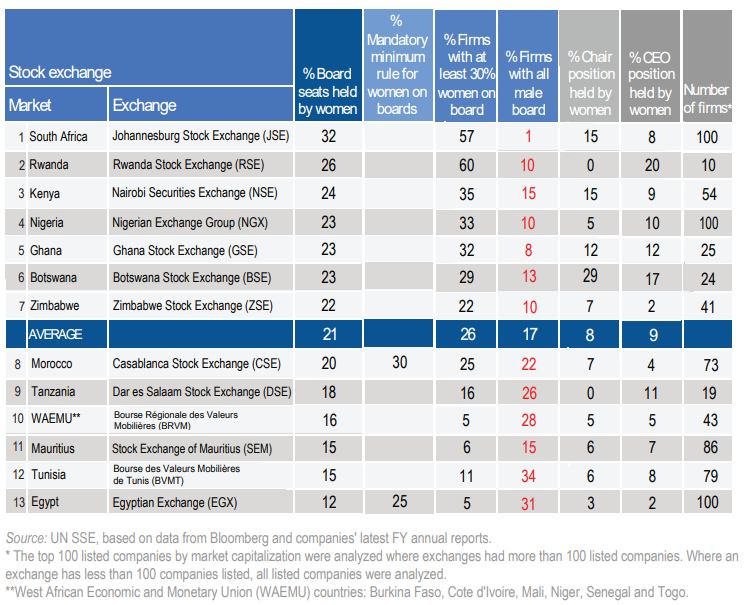Pulse54: African markets need women leaders
The continent's private sector shows uneven progress in women's leadership. Strategic policies, quotas, and mentorship programs offer pathways to meaningful inclusion.
Hey👋🏽
It’s Mike here. Welcome to another edition of Pulse54.
As we reflect on International Women's Day, celebrated last Saturday, March 8, it's an opportune moment to examine the status of women in corporate leadership across Africa.
Before we proceed, if you haven't subscribed to this newsletter, join thousands of smart people curious about the continent.
Let’s dive right in.
While Africa has made significant strides in recent years, data shows there's still considerable room for improvement in achieving true gender equality in boardrooms and executive suites.
Women hold just 21% of board seats across the continent, only 8% of board chair positions, and 9% of CEO positions per a 2023 report by the UN and IFC.
Some African markets lead the way.
The Johannesburg Stock Exchange (JSE) in South Africa tops the list with 32% of board seats held by women, followed by the Rwanda Stock Exchange (26%) and the Nairobi Securities Exchange (24%).
When it comes to board chairs, the Botswana Stock Exchange shows the highest percentage of women at 29%, while Rwanda leads in female CEOs at 20%.
Despite these bright spots, all-male boards remain stubbornly common.

Beyond Numbers: The Challenge of Tokenism
While statistics are important indicators, they don't tell the full story.
Many African businesses have embraced the concept of gender diversity on paper, but implementation often falls short of meaningful inclusion.
For instance, many organizations still practice what experts call "tokenism" – appointing a single woman to their board to meet diversity quotas rather than pursuing genuine inclusion.
This approach often results in women being present but lacking real influence in strategic decision-making.
The data supports this concern: the report notes that in 11 out of 13 analyzed African markets, more than 10% of boards are exclusively male, with five markets showing over 20% all-male boards.
The challenge extends beyond mere representation, however.
In many African businesses, female executives are frequently steered toward traditionally "soft skill" roles such as human resources or corporate social responsibility.
Meanwhile, key positions in finance, technology, and operations remain overwhelmingly male-dominated.
The Business Case for Gender Diversity
Gender diversity in leadership isn't just about fairness—it makes business sense.
Research shows that companies with gender-diverse boards are not only more equitable but also more effective in driving sustainable practices.
They are up to 60% more likely to reduce energy consumption intensity, 39% more likely to reduce greenhouse gas emissions, and 46% more likely to reduce water usage.
Even financial performance improves with greater female representation in leadership.
McKinsey research found that companies with diverse executive teams outperform their peers by 25% in terms of profitability.
Pathways to Progress
Several African countries have implemented successful strategies to increase female representation in leadership.
Rwanda stands out with policies mandating a 30% quota for women in leadership roles, resulting in women holding 61% of seats in the lower house of parliament and increasing representation in corporate boardrooms.
On the regulatory front, Egypt and Morocco have introduced mandatory minimum rules for women on boards.
In Cairo, 25% of board seats must be filled by women, while the latter requires 30% female representation by 2024, increasing to 40% by 2027.

Beyond policies, mentorship can be a critical tool for fostering female leadership.
Established women leaders can guide emerging talent, helping them navigate challenges and develop essential skills.
For individual women aspiring to leadership roles, experts recommend establishing clear career objectives, staying technologically savvy, taking calculated risks, maintaining ethical standards, embracing lifelong learning, and building strong professional networks.
Investing in Women-Led Companies
For those looking to support gender equality through investments, initiatives like Daba’s Women in Leadership collection of stocks listed on the BRVM (Bourse Régionale des Valeurs Mobilières) provide an opportunity.
This collection, which has shown positive returns (17.51% year-to-date), includes companies in francophone West Africa with significant representation of women in leadership, robust diversity policies, and initiatives to advance women's participation in the workforce.
It serves as a key benchmark for evaluating market trends and the performance of gender-focused initiatives in the region.
Moving Forward
While progress has been made in increasing women's representation in corporate leadership across Africa, much work remains.
Moving beyond tokenism to meaningful inclusion requires organizational commitment to structural change, and policy support from governments and regulatory bodies.
As we move past International Women's Day celebrations, the focus must remain on year-round efforts to dismantle barriers, create opportunities, and build supportive environments where women can thrive as leaders.
Only then can African businesses truly harness the diverse perspectives necessary to drive innovation and growth in an increasingly competitive global marketplace.
That’s it for this edition.
You can also download the Daba app to access vetted investment opportunities in African VC - from exciting early-stage startups to professionally managed venture funds.
Until next time!






